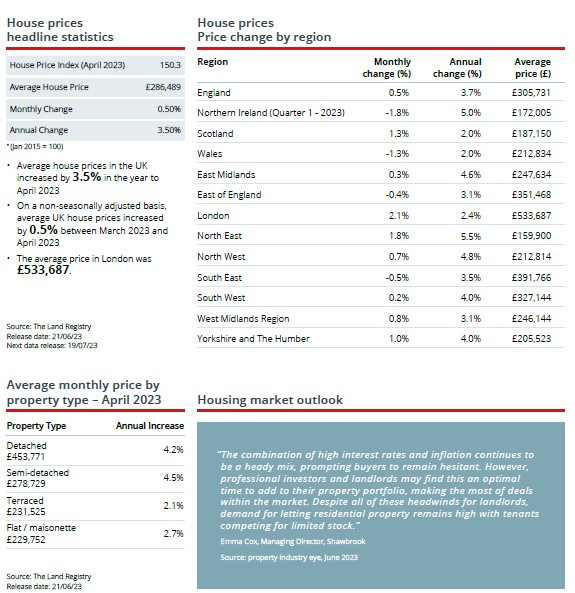Mixed signals in mortgage and housing markets
Inflation hasn’t been falling as quickly as anticipated, resulting in the Bank of England coming under pressure to raise Bank Rate again in May. While lenders had priced in some interest rate rises in advance, the market reaction to inflation data released in May suggests that tolerance had been exceeded and mortgage rates reversed their downward trend.
Some lenders also pulled many of their mortgage products to reprice them. According to Savills, the number of first-time buyer (FTB) products available at the start of June was 4.4% lower than a week earlier. This is significant, but a very different picture to the 50% fall in products in the week after the mini-budget last September.
The Royal Institution of Chartered Surveyors (RICS) reported positive news that new instructions rose by a net balance of +14% of survey participants during May, breaking a run of thirteen successive negative monthly readings and representing the strongest reading for the new listings metric since March 2021.
Fewer would-be tenants fly the nest
According to new research by Hamptons, young adults are staying at home for longer to save up for their own property, with some skipping the rental market entirely and going on to buy a home instead.
The number of tenants leaving the family home has been steadily declining across the UK since 2015 when 6.1% of tenants were first-timers – equating to 71,860 newly rented households in England. However, due to rising rental costs and the cost-of living pressures, in the first five months of 2023 that figure has fallen to 4.6% – or 43,280 new rented households in England.
Interestingly, London bucks this trend. Despite double-digit rental growth, the share of renters who have left the family home to rent in the capital has risen from 2.5% in 2022 to 3.2% so far this year. This reflects how more young adults, many of whom moved home to be with their families during the pandemic are now moving back to the capital for work.
Latest news for FTBs
The average deposit paid by a UK first-time buyer for a three-bed home costing £240,000 is £34,500, assuming a 15% deposit, Zoopla has found. But the amount you need to save varies according to where you live in the UK and of course, the level of deposit you wish to pay.
Unsurprisingly, London is at the most expensive end of the market, where the average first home costs £425,000. And, according to UK Finance, the average first-time buyer will pay a 34% deposit to secure it – amounting to £144,500.
Rightmove has revealed the cheapest cities for FTBs, which is topped by Bradford, where the average asking price for a FTB property is £104,643. Making up the top five are Carlisle, Aberdeen, Hull and Dundee.

All details are correct at the time of writing (21 June 2023)
It is important to take professional advice before making any decision relating to your personal finances. Information within this document is based on our current understanding and can be subject to change without notice and the accuracy and completeness of the information cannot be guaranteed. It does not provide individual tailored investment advice and is for guidance only. Some rules may vary in different parts of the UK. We cannot assume legal liability for any errors or omissions it might contain. Levels and bases of, and reliefs from, taxation are those currently applying or proposed and are subject to change; their value depends on the individual circumstances of the investor. No part of this document may be reproduced in any manner without prior permission.
